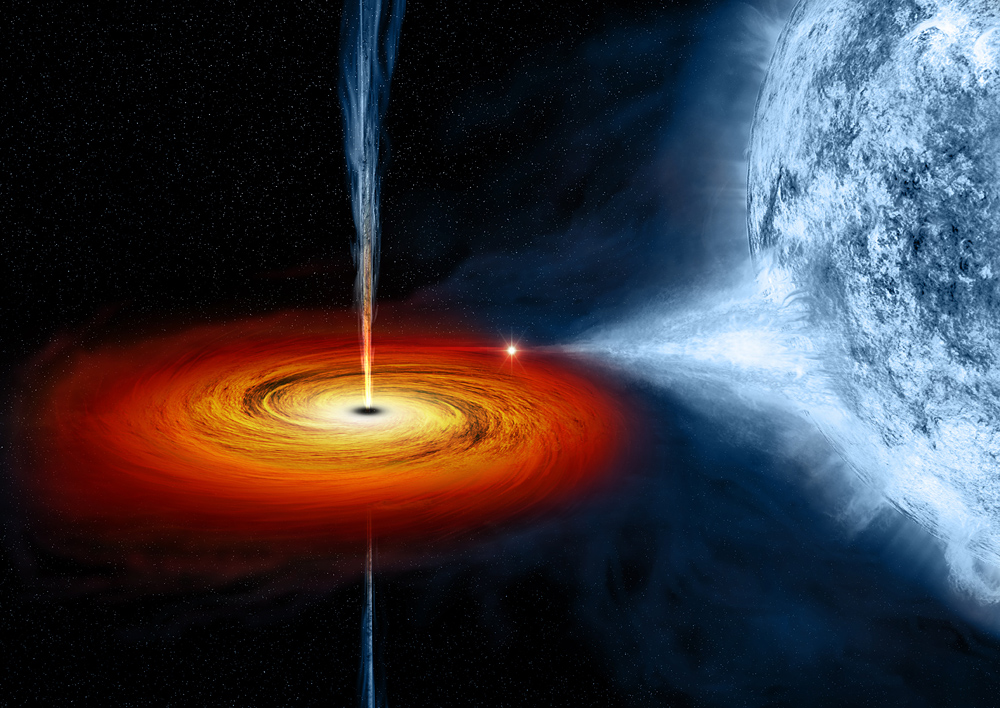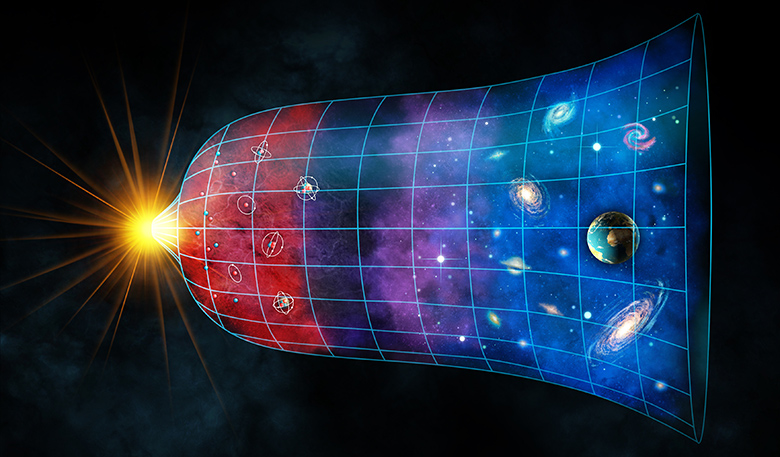Einstein Explains God's Six-Day Creation
God saw everything that he had made, and, behold, it was very good. There was evening and there was morning, the sixth day. Genesis 1:31
In Genesis 1, the Bible tells us that God made everything in six days. Yet according to modern science, the Earth is 4.5 billion years old. And the universe is something like 10-15 billion years old.
Which is right? This page offers a clear and scientific answer, which resolves the issue, and allows them both to be correct, and without having to compromise by making the "days" mean symbolic of much longer time periods. They can still be literal days in the sense of 24-hour, 86400-second ordinary Earth days, and this can still be fully consistent with the conclusions made by modern science.
A lot of people have really struggled with this issue. Since it appears that either one or the other of these must be true, and one of them false. Many people reconcile the differences by accepting the six "days" of creation as time periods in a sense, but not "literal" days in the sense of what we usually think of as Earth days. Yet, thanks to modern science, even that much compromise is unnecessary. It's possible for them both to be literally true.
It's entirely possible for the days to be literally earth-day-long days, and also for the universe to be billions of years old. That sounds completely impossible, but, thanks to Einstein, modern science provides us with a method of resolving this. And if it's possible for an activity of the human mind (like physics) to explain this, then how much more possible for God to be able to achieve it?
You don't even need a university degree to understand this. It's taught in senior high-school physics, and the concepts can be understood my most people — with a bit of thought put into it.
Time is Relative, Not Absolute
The basic idea is that time is not an absolute thing. It depends on your perspective. Very strange, but very true. It's actually completely possible (under the right conditions) for something to take an hour for one person and for the exact same actual event to happen over a year for another person.
That seems like it would be impossible outside of science fiction. It's obviously completely counter-intuitive to what we experience in ordinary life. Which is probably why it's been such a big struggle for people who want to believe in both the Bible and in many of the findings of modern science.
This has been known to science since 1905, when Einstein developed his Special Theory of Relativity.
Time Slows Down When You Travel Fast
The Theory of Relativity is capable of fully accounting for how something could take six days and yet also take billions of years.
How can that even be possible? On the surface it appears to be completely impossible.
Yet it must happen, according to relativity. And it does actually happen, according to a vast amount of scientific experimental data which has been used to verify the theory of relativity.

Time dilation explains why two working clocks will report different times after different accelerations. For example, at the ISS time goes slower, lagging 0.007 seconds behind for every six months. For GPS satellites to work, they must adjust for similar relativistic bending of spacetime to coordinate with systems on Earth. Photo by NASA / Wikipedia.
The answer that things we thought of as being fixed and definite for much of the human history are actually flexible. In this case, the paradox is resolved by the discovery by Einstein that time and length themselves are not the same when observed from different reference frames.
It's become well known by some subsets of popular culture (such as science fiction). But, perhaps because of its strangeness, less well-known by the general public. I tried to explain it to my 81-year-old mother the other day and she said she didn't believe it, and that Einstein and the rest of the scientists must be wrong. But assuming you believe in Einstein and in the vast body of experimental evidence that verifies the theory of relativity, they aren't wrong, and time is relative, not absolute.
Two Twins
One of the most popular examples is that of two twins (though they don't need to be twins, they could be anyone at all and it would still work). One of them leaves Earth, and travels very fast in a spaceship (a significant fraction of the speed of light), for a long way, and then returns to Earth. When he gets back, his twin is literally older than he is. More actual literal time has gone by for the people on Earth (including the stationary twin) than the time that has gone by for the person on the spaceship.
The closer you get to the speed of light, the stronger this effect is. If you were to travel at close enough to the speed of light, it would be literally possible for billions of years to go by on Earth while only six literal days of time (as measured by an ordinary clock and also measured by your own body's biological processes) had passed on the spaceship.
So, according to modern science, it is fully, completely, literally possible for something to happen in six days and yet also for the exact same event to happen over billions of years. Provided that the two observers are observing from different enough situations. Despite this being counter-intuitive, it's what modern science tells us. Both the theoretical science as developed by Einstein, and then later a huge amount of experimentally measured evidence has validated that this is actually what really does happen, in real life.
And that's just one example of how time is not fixed in the way that we normally think of it. There are others.
Time Slows Down Near a Black Hole
Another good example, which came later — with the discovery (again by Einstein) of General Relativity in 1915 — is that time slows down in the presence of gravitational fields. Like with special relativity and the speed of light, in ordinary everyday life situations (where you aren't travelling anywhere near close to the speed of light) these effects are so tiny as to never be noticed (or even big enough to measure).
These effects do happen on Earth too, but at a very subtle level. For example, at sea level you age one-billionth of a second less every year than you would if you lived on top of Mt. Everest. Because the Earth's gravitational field is slightly stronger, when you're slightly closer to the centre of the Earth. The gravitational effects on time require a lot of gravity to become truly noticeable. Yet, if you have enough gravity, they become extremely noticeable.

Time slows down near a black hole. Photo by NASA/CXC/M.Weiss/Wikipedia.
The most commonly discussed example of this effect of gravity on time is close to a black hole. Since black holes have more gravity than anything else (pretty much by the definition of what a black hole is). The closer you get to a black hole (and therefore the stronger the gravitational field you experience), the more that time as you experience it will slow down, compared to the rate that time passes away from the black hole.
The effect on time close to a black hole is similar to the experience of the twin travelling really fast in the spaceship. Close to the black hole, you will age less than people far away from it will. If you're close enough to the black hole, you could literally sit there (if you hadn't been crushed to death by the intense gravity) for six literal days of your literal actual time, while you literally watched billions of literal actual years of time go by for people far away from the black hole, in the same time period that took six actual literal days of your time.
So it is entirely possible for something to happen literally in six literal days, and yet also happen over billions of years. And if human scientific understanding can explain this, with our limited mortal human brains, how many more things are possible with God?
And even with just the level of difficulty of understanding that's been explained on this one web page, and nothing more than that — it would be possible for God to have been sitting in a strong gravitational field (and/or travelling very fast) when he created the universe in six literal days of time, and that same literal six-day period experienced by God would have taken billions of literal years to occur on Earth.
I think it's also safe to assume that God knows more about the universe than we as mortal humans do. So there must be even more things than we can think of — that would make it possible for God's Word to still be true — while we as humans are still able to observe the things that we do observe about the natural world. And with there being no real contradiction, apart from perhaps occasionally an illusory one created by our own lack of ability to understand the bigger picture, and how everything all fits together.
The Bible Told Us This All Along
Long before Einstein gave us the Theory of Relativity to explain how time can be literally different for different observers, it was written in the Bible:
For a thousand years in your sight are like a day that has just gone by ....
Psalm 90 is attributed as "A prayer of Moses, the man of God". Wikipedia says that "Unique among the Psalms, it is attributed to Moses, thus making it the first Psalm to be written chronologically."
The New Testament also gives us a similar message:
But don't forget this one thing, beloved, that one day is with the Lord as a thousand years, and a thousand years as one day.
Having studied and taught relativity physics, and also being a Christian, to me this seemed like an obvious resolution to the issue of six days versus billions of years. After writing up the first draft of this page I had a look online for others who had arrived at a similar explanation. You can read more about them using Google Search.
Later on I'll go over this whole page, and fix it up some more, and improve it...
The Bible verse says God made "everything" in six days. Logically that would imply that it took God six days in his time frame to make everything. It doesn't say that God made everything while we watched it all happen in six days. Or that God made everything in six days as seen in the time frame of some other observer .
A Broader Perspective.
Much of the last few hundred years of the human race has involved us making all kinds of new and amazing discoveries. Which have contributed to things like science and the industrial revolution.
The initial response of much of humanity from this has been to move away from traditional teachings. Like feelings of trust that our Father in heaven knows more than we do. And that his word in the Bible contains more wisdom than our own human wisdom. This disbelief in our heavenly father is very much like the adolescent stage of modern life.
However, as humanity matures, it becomes more clear (at least to some) that those disbelieving ideas were based on partial truths, from not seeing the whole picture — and were therefore incorrect. And that modern discoveries (like the genuinely experimentally verifiable parts of science — as opposed to the other kind of "science") do not contradict the truths of God's word in the Bible.
This page is a small part of a greater effort to bring the ancient truths of scripture back into relevance in our modern world.
God's truth is not made invalid by the ways that some things appear to mortal humans, when viewed in a certain way. This includes modern observations, made under certain highly specific conditions, where they appear to contradict the Bible. And often originating from a godless philosophy that's very different to the days when basically everyone from Western backgrounds (including the founders of science itself) believed in the Bible.
Cover image by Andrea Danti / Shutterstock. The expansion of the universe from the Big Bang to the present.








